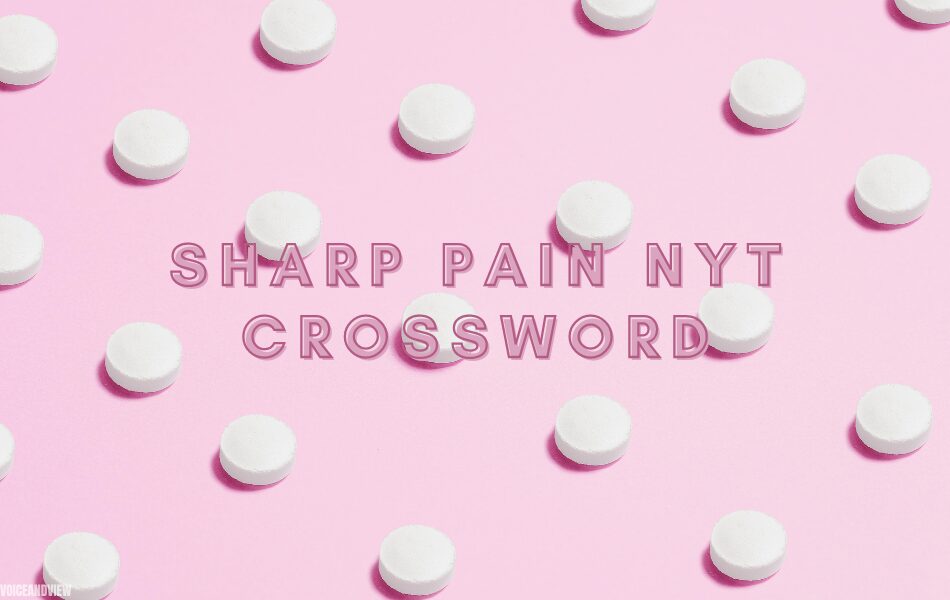Sharp Pain NYT Crossword: Ultimate Guide to Crack the Clue

There’s nothing quite like the satisfying moment when a challenging crossword puzzle finally yields. But what about those pesky clues that leave you scratching your head? For many, the phrase “sharp pain” has been the culprit of countless crossword conundrums. Today, we dive deep into the world of crossword puzzles, specifically tackling the enigmatic clue, “sharp pain.” Our aim is to provide comprehensive insights, beyond just the answer, to elevate your crossword solving game. We’ll explore potential solutions for the “sharp pain nyt crossword” clue, offer strategic tips, and even delve into the fascinating realm of pain to enrich your overall puzzle-solving experience.
Contents
- 1 Cracking the Clue: Sharp Pain
- 2 Beyond the Answer: Understanding Pain
- 3 Enhancing Your Crossword Skills
- 4 Conclusion: Sharp Pain NYT Crossword
- 5 FAQs
- 5.1 Q: What are the possible answers for the crossword clue “sharp pain”?
- 5.2 Q: How can I improve my crossword puzzle solving skills?
- 5.3 Q: What are the different types of pain?
- 5.4 Q: When should I seek medical attention for sharp pain?
- 5.5 Q: Can you provide some general tips for solving crossword puzzles?
Cracking the Clue: Sharp Pain
Let’s start by deciphering the core of the puzzle: the clue “sharp pain.” While this might seem straightforward, the world of crossword puzzles often hides layers of complexity. Understanding the potential answers is crucial. Typically, the length of the answer dictates the possibilities. For instance, a three-letter sharp pain might be a “STAB,” while a longer answer could be “AGONY” or even “TWINGE.”
The devil, as they say, is in the details. Clues aren’t always as direct as “sharp pain.” They might be shrouded in synonyms or descriptive language. Clues like “sudden sharp pain” could point to “JAB” or “STING,” whereas “sharp stabbing pain” might lean towards “LANCE” or “DAGGER.” Recognizing these nuances is key to unlocking the puzzle.
Beyond just finding the right answer, understanding the context can be a game-changer. Many crossword puzzles, especially those in publications like the New York Times, often intertwine with other clues. For instance, if a nearby clue mentions a medical professional, the answer to “sharp pain” might be a more clinical term like “ACHE” or “PAIN.”
Developing a keen eye for patterns and synonyms related to pain can be a significant advantage. Words like “acute,” “intense,” or “piercing” can all be indicators of sharp pain. Building a mental thesaurus of pain-related terms can help you navigate through even the most challenging puzzles.
Remember, crossword puzzles are a form of mental exercise. Enjoy the challenge, and don’t be afraid to experiment with different possibilities. With practice and a strategic approach, you’ll be solving those sharp pain clues in no time.
Beyond the Answer: Understanding Pain
While solving a crossword puzzle can be immensely satisfying, it’s also an opportunity to learn something new. Understanding the concept behind the clue can add depth to your puzzle-solving experience. Let’s explore the multifaceted nature of pain.
Pain is a complex sensation that can manifest in various forms. Acute pain is typically sharp and short-lived, often resulting from an injury. It serves as a vital warning signal, prompting us to address the underlying issue. On the other hand, chronic pain persists for extended periods, significantly impacting a person’s quality of life. Neuropathic pain, a particularly challenging type, arises from damage to the nervous system, often causing shooting or burning sensations.
The causes of sharp pain are equally diverse. Common culprits include injuries, muscle strains, headaches, and nerve-related conditions. It’s essential to remember that this information is a general overview and doesn’t constitute medical advice. If you’re experiencing persistent or severe sharp pain, consulting a healthcare professional is crucial.
While most sharp pain is manageable, certain instances warrant immediate medical attention. Severe pain accompanied by other symptoms like difficulty breathing, chest pain, or sudden weakness requires prompt medical evaluation. It’s always better to err on the side of caution when it comes to your health.
Disclaimer: The information provided in this article is intended for general knowledge and informational purposes only, and does not constitute professional medical advice. Always seek the advice of a qualified healthcare provider for any questions you may have regarding a medical condition.
Enhancing Your Crossword Skills
Mastering the art of crossword puzzles requires more than just luck and intuition. It’s a skill that can be honed with practice and strategic thinking. Let’s delve into some techniques to elevate your crossword game.
One of the most effective strategies is to approach puzzles systematically. Start with the clues you find easiest, gradually building a foundation for tackling the more challenging ones. Look for patterns in the grid, such as common letter combinations or symmetrical structures. These observations can provide valuable clues. Additionally, paying attention to the puzzle’s theme can offer insights into the wordplay employed.
Expanding your vocabulary is undeniably beneficial for crossword success. Immerse yourself in reading materials, from classic literature to contemporary articles. Consider using vocabulary-building apps or online resources to introduce new words into your lexicon. A robust vocabulary equips you with a wider range of potential answers.
In the digital age, a plethora of online tools can assist crossword enthusiasts. Crossword solvers can provide hints or even complete answers when you’re stumped. However, it’s essential to use these tools judiciously to maintain the challenge and satisfaction of solving independently. Online forums and communities dedicated to crossword puzzles offer a platform to connect with fellow enthusiasts, share tips, and seek help when needed. Engaging with other solvers can provide fresh perspectives and inspire new problem-solving approaches.
Remember, the journey to becoming a crossword virtuoso is an ongoing one. Embrace the challenges, learn from your mistakes, and most importantly, enjoy the process. With dedication and a strategic mindset, you’ll be well on your way to conquering even the most formidable puzzles.
Conclusion: Sharp Pain NYT Crossword
We’ve journeyed from the seemingly simple crossword clue “sharp pain” to a deeper exploration of language, pain, and puzzle-solving strategies. By understanding the nuances of the clue, exploring the nature of pain, and honing your crossword skills, you’re well-equipped to tackle even the most challenging puzzles. Remember, crossword solving is not just about finding the right answer but about expanding your knowledge and enjoying the mental exercise.
We encourage you to share this article with fellow crossword enthusiasts, leave your thoughts in the comments section, and continue exploring our website for more insightful content. By working together and sharing our knowledge, we can build a vibrant community of crossword lovers.
So, the next time you encounter the pesky “sharp pain nyt crossword” clue, you’ll be armed with the tools and information to conquer it with confidence. Happy puzzling!
FAQs
Q: What are the possible answers for the crossword clue “sharp pain”?
A: The possible answers for the crossword clue “sharp pain” depend on the number of letters required. Common answers include “STAB,” “AGONY,” “TWINGE,” “JAB,” “STING,” “LANCE,” “DAGGER,” and “ACHE.”
Q: How can I improve my crossword puzzle solving skills?
A: To enhance your crossword puzzle solving skills, focus on systematic problem-solving, expand your vocabulary, utilize online tools strategically, and engage with crossword communities.
Q: What are the different types of pain?
A: The primary types of pain include acute pain (sharp and short-lived), chronic pain (persistent), and neuropathic pain (originating from nerve damage).
Q: When should I seek medical attention for sharp pain?
A: Seek immediate medical attention for sharp pain if it’s severe, accompanied by other alarming symptoms like difficulty breathing, chest pain, or sudden weakness.
Q: Can you provide some general tips for solving crossword puzzles?
A: Start with easier clues, look for patterns in the grid, consider the puzzle’s theme, and build a strong vocabulary to improve your crossword puzzle solving skills.








